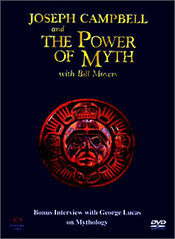The Power of Myth (Joseph Campbell)
Bill Moyers' interview with Joseph Campbell is a really powerful book/video which suggests
how myths (used in the technical sense) has power to shape values and group identity.
Greek and Latin and biblica1 literature used be to be part of everyone's education. Now, when these were dropped, a whole tradition of Occidental mythological information was lost. It used to be that these stories were in the minds of people. When the story is in your mind. then you see its relevance to something happening in your own life. It gives you perspective on what’s happening to you. With the loss of that, we've really lost something because we don't have a comparable literature to take its place. These bits of information from ancient times, which have to do with the themes that have supported human life, built civilizations, and informed religions over the millennia, have to do with deep inner problems inner mysteries. inner thresholds of passage, and if you don't know what the guide-signs are along the way, you have to work it out yourself. But once this subject catches you, there is such a feeling, from one or another of these traditions, of information of a deep, rich, life~vivifving sort you don’t want to give it up. Campbell, 2
The Genesis "myth" is included in Campbell's collection of myths highlighted, and if you look at the bottom of the picture, you will see the words "Bonus Interview with George Lucas on Mythology." Yes, Joseph Campbell was very interested in George Lucas's work (and vice versa) because Star Wars represents a modern powerful, almost universal narrative which captures the elements of myth. My sense is that the most pervasive, shared contemporary myths have to be those propagated through the synergistic video-gaming/movie industry -which is why I am mindful of the power of the creative, knowledge class!!!
In a postmodern society, there is a sense that all stories matter and have the same function. Grenz writes:
In a pluralistic age, belief is "in." This is a good thing. Indeed, an important contribution of our pluralistic context has been its reaffirmation of the importance of believing. Yet, many voices assert that it really doesn't make any differece what you believe so long as you believe something–anything. Therefore, we ask, "Do beliefs matter at all? Is what you believe important?"
Christian apologists argue that there must be reason to trust the story you commit yourself to. So the big question is, if the Christian myth (used in a technical sense again) makes claims to be trustworthy, what in the story is so compelling and powerful?


0 Comments:
Post a Comment
<< Home